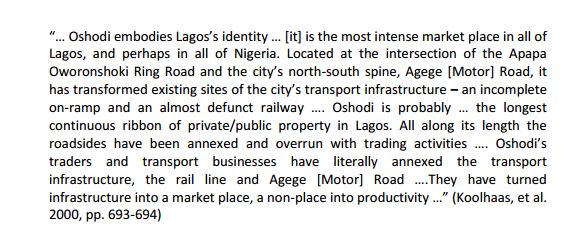The Lagos state government has recently come under fire from Nigerians on social media for demolishing the Owonifari market in Oshodi, which, according to Premium Times, has been around for about 40 years. The demolition exercise took place at 7:45am yesterday and was supervised by the state governor, Akinwunmi Ambode, who has previously been criticized by the media for not been as active as his predecessor, Babatunde Fashola, in the state.
Before the demolition, the State Commissioner of Information, Steve Ayorinde, said the market would be shut due to security challenges in the area, while mentioning that traders in the market had been relocated to the new Isopakodowo market stalls in Bolade, Oshodi, Lagos state. He said the exercise would enable the state commence the transformation of the Oshodi bus stop to an ultra-modern bus terminal. Before now, Oshodi market was a haven for street urchins generating insecurity issues in the state.
It was in 1968 that Henri Lefebvre came up with the concept of the ‘right to the city’, where he sought to ease the understanding of the common good as opposed to the individual needs of people within a society. In his February 2015 thesis at Cardiff University, Ademola Omoegun wrote extensively about the concept in relation to Lagos’s informal economy, which provides livelihoods for, perhaps, millions of people. Here, he also talks about the several attempts made by the government to sanitize the city, which has led to the displacement of street traders.
However, in many circles, Oshodi market is considered a financial/economic powerhouse of sorts.
In the thesis, Oshodi market is described as the outcome of an inefficient and dynamic convergence of various forces on this strategic site and, as a result, its potential remains unattainable. There has been a longstanding need for an intervention in Oshodi market as well as an improved management of informal economic activities in Lagos.
While citing an earlier essay, Omoegun states that “a rights-based approach to urban management suggests the clarification of the rights of urban public space users and the empowerment of public authorities to protect the larger interests of citizens.” This basically means that as unfair as it seems, the government will engage in actions like this but, it is often for the greater good regardless of who gets hurt in the process. Those who have cried foul for the Oshodi market demolition, have to take into consideration the fact that Lagos state government needs to pave the way in order to upgrade its infrastructure.
Omoegun’s thesis defines an urban public space as ‘any physical space not recognized as private and to which even a minimal level of public use is acceptable, with this irrespective of ownership, whether government owned or otherwise.’ Following from this, the Oshodi market could be cited as an urban public space. The thesis goes further to say that the displacement of street traders from central locations is a widespread policy adopted by government authorities in developing world cities, sometimes to alternative sites.
He also suggests, from earlier studies, that city authorities determined to keep their cities orderly typically evict informal economic activities from parts of the city as part of efforts to encourage public cleanliness, with the environmental, traffic, health and safety issues associated with informal economic activities emphasized in order to justify their actions.









